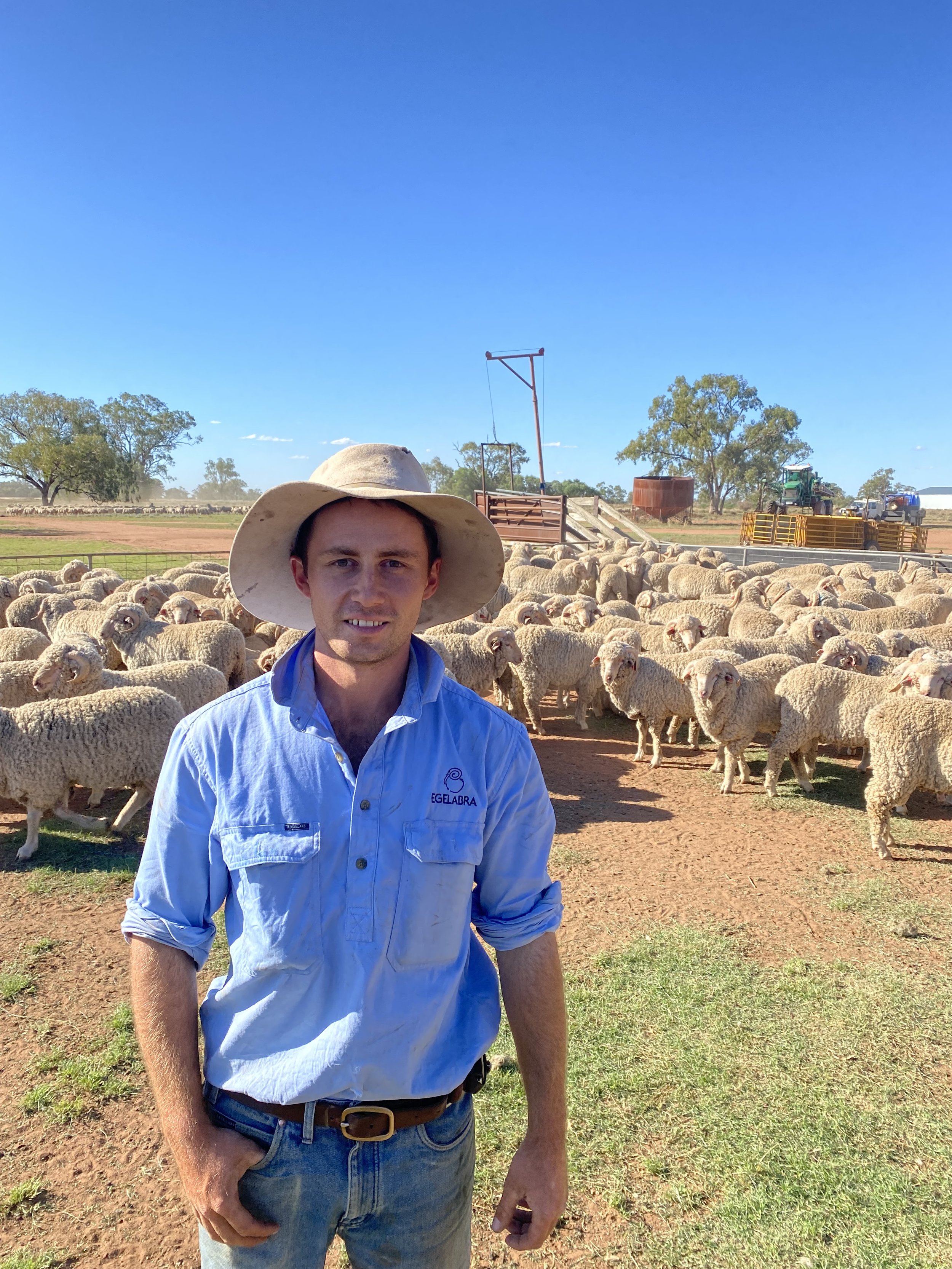“My generation is starting to see the impacts of unsustainable practices across agriculture. It is also up to my generation to improve on this to ensure a sustainable future.
“While managing land correctly and being involved in the production of wool may seem like small steps in creating a sustainable future, it is a multitude of small steps that can lead to big changes.”
Austin Grace
2023
Agriculture
In honour of Frank Mansell
My Global Footprints Scholarship will allow me to gain valuable contacts, professional development, and the opportunity to see different aspects of the supply chain in my industry.
Being able to travel internationally and see a range of different operations and management practices will be invaluable to my career progression in livestock management.
I am passionate about sheep and wool.
In my current job as Assistant Manager at Egelabra Station; I am responsible for running the livestock on the property and have three jackaroos whom I lead and train.
My job allows me to work with quality wool-growing merinos on a large scale. Being involved in the management of merinos from joining through to weaning is something which is very rewarding. Also being a merino stud, I get to pursue my passion for genetics and assist in the better breeding of merinos.
While obtaining my wool classing certificate I was nominated to compete in the 2022 AWEX national graduate wool classer’s competition, in which I placed 1st. I am extremely passionate about sheep and wool and the knowledge obtained at work and in the wool classing course has allowed me to achieve this.
Something that I am currently doing at work which I am proud of is running a feedlot finishing 3000 merino wether lambs. The feedlot is opportunistic and is being run due to a dry period prioritising feed for lambing ewes. It is the first time I have been involved with feed-lotting so the experience has been challenging but rewarding and I am learning a lot through the process.
Regenerative Agriculture is something that I am passionate about.
Effective land management is key to creating a sustainable future. I learned about a range of management practices that can be implemented to better manage grazing and pastures. In my job I use planned grazing management; estimating feed on offer and grazing for a period of time followed by rest periods allowing for pastures to recover. The aim of these techniques is to increase groundcover which leads to improved soil health and environmental sustainability.
In my current job i am directly involved with sheep and wool production, the company produces 1600 wool bales annually across its five properties. I believe wool is the most environmentally friendly and sustainable fibre that can be produced. It is a naturally produced product that is biodegradable, requires low inputs in its production, and it lasts for a long time as a product. In comparison to other fibres wool is in a good position to improve environmental sustainability in the future. I am also in a business partnership where we grow merino wethers for wool production; so, I am involved in wool production as a producer and see the benefits in producing the fibre.
While managing land correctly and being involved in the production of wool may seem like small steps in creating a sustainable future, it is a multitude of small steps that can lead to big changes.
I believe it is important to play my role in implementing sustainability in my work where possible.
This topic is important to me as my generation is starting to see the impacts of unsustainable practices across agriculture. It is also up to my generation to improve on this to ensure a sustainable future.
With my Global Footprints Scholarship, I would like to travel to either New Zealand to focus on livestock management, and / or to Italy or China to focus on wool production and processing.
New Zealand is progressive in its sheep and wool production. Having a high prevalence of electronically tagged animals and having implemented non-mulesing regulations in its sheep flock. If I was to travel to New Zealand, I would like to learn about their use of electronic tags and other management practices in relation to non-mulesing regulations as these will eventually be mandatory in Australia. I would also be interested in learning about the different types of sheep they have over there that suit the environment and operations.
I am interested in travelling to Italy and China because I am involved in the production of fine wool. The wool produced on farm can be directed into the European market and has an end use in finer apparel products that are processed in Italy. Wool is also distributed to China and Japan. I would like to learn more about the processing requirements of wool and how the management practices set on farm can have an impact on the final product.
With many contemporary issues in the sheep and wool industry it would also be on opportunity to gain an insight into different information, perspectives, and seek opportunities to potentially change management strategies in the operation I work in to better meet consumers.
“It has been a pleasure to review an application which aligns with the purpose and ideals of the Global Footprints Scholarship program. Austin shows great qualities, including leadership. He really researched where he wants to go, and regenerative agriculture is a good sustainability tool moving forward.” - Assessment Panel


